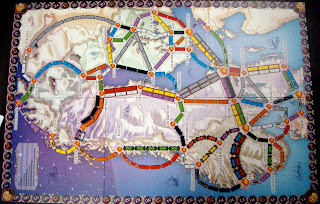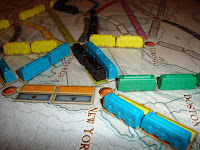Designed by Alan R. Moon, published in the US by Days of Wonder.
I’m going to talk mainly about the US version, but I’ll bring in some of the differences between versions.
Components
 |
| A station from Europe with trains from all versions |
The components in TtR aren’t amazing, but they do a great job for what the game needs. The cards are of good quality, the wood score tokens (plastic in Marklin) are nice, but easily roll around. The best component are the plastic trains. They have a bit of sculpting on them, and while they are all the same save color, they still are an enjoyable visual aspect. The boards are also well designed, especially the Nordic map with a winter motif.
8/10
 |
| The Nordic Countries Board |
Game Mechanics
Ticket is a very basic game in terms of what you can do on your turn. You have the choice to draw two train cards into your hand, play a set of train cards from you hand to the board to claim a connection between two cities, or draw more route tickets. This goes on until one player has 2 of fewer trains remaining in their stash, then everyone gets one final turn. At that point you add up points from trains on the board and your completed tickets, subtracting for any tickets you didn’t complete and the high score wins.
8/10
Player Interaction
On the surface TtR doesn’t offer a lot of interaction, but as you dig deeper you start to see how players build their routes, and then you can block them, or at least re-route them a bit, costing them trains, turns and cards. You also gain a sense of what routes to build early, and which ones can wait based on what other players are doing. If this blocking sounds a bit mean, I suggest the Europe edition which gives players 3 stations, allowing them to borrow someone else’s connection to use as their own.
5/10
The Twist
There are double routes, but the second part is only open in a 4 or 5 player game, which makes a 3 player game rather tight.
 |
| Showing an open double route, blue occupying one part of a double and blue and black using both parts of one. |
TtR is fun because when you’re done you can actually see the route you built over the board. This gives everyone, especially young children something to appreciate afterwards even if they don’t win. I play the game where you don’t score trains as you place them on the board, but rather at the end which enhances the late tension. Besides that, there isn’t really a twist.
Learning Curve
Ticket is probably one of the easier games for anyone to sit down and play. It may take a turn or two for some to understand, but I’ve seen new players pick it up and play well in their first game.
Learning Curve - Short
Why I like this game
There’s a lot to like about TtR. It’s simple and plays in an hour or less. With the expansion (1910 for US, 1912 for Europe) there’s a lot of replayability and variety in the tickets. New players can easily understand what’s going on and can keep up with experienced players. There’s also enough depth for experienced players to enjoy over and over again.
Why I don't like this game
The game can take a bit long at the beginning, because everyone is just drawing cards. There is a dice expansion which allows players to start placing routes on the board right away, but that has it’s own drawbacks. Other players can conspire to block you, or you may find yourself unable to complete a ticket, but that doesn’t happen all the time.
Overall
It’s hard to find a lot that I don’t like about Ticket to Ride. The US is great for getting into the game, Europe adds some complexity, but also is a nicer way to play, Nordic takes the complexity of Europe and gets rid of the stations, and Marklin adds a lot to the game, turning it into more of a gamer’s game, but something that is more than TtR needed. Ticket to Ride is a game that is more than the sum of it's parts, which is fortunately a good thing.
Scores
US - 9/10 - geography familiarity
Europe - 9/10 - niceness
Nordic - 9/10 - heritage
Marklin - 8/10 - additional complexity knocks it down
If I had to take one, I'd take Europe, and if you give me a 2nd, I'll take Nordic, but that's not to say that the US is a bad version.
Will you like this game?
If you like boardgames at all, you’ll probably enjoy this in some version. I can’t promise that, because I do have friends that don’t like it. It’s not a deep game, and I think the fun for me lies in trains and simple mechanics. There is an elegance to Ticket to Ride that I’ve not seen elsewhere.
A Good Moment with the Game
One of my favorite moments of Ticket to Ride was a 5 player that was tight all the way through. When we counted up the scores, another player and I were tied. We searched the rulebook for the tie-breaker, and were tied for that. So that left us in a pure tie, which normally I dislike, but this time, with 5 players and 2 of us tied several points ahead of the others, it actually worked.
Final Thought
As a child, I had a huge obsession with trains. It started with Thomas the Tank Engine, though I always preferred James since he was red. It then grew to include Lionel trains, as well as trips to the Santa Barbara Train Museum. So that made the theme of this game work perfectly for me.
Ticket isn’t that deep, but it is fun for what it is. I find it best with 2 or 4 players, since most of the time 3/5 feels too crowded for the routes that are open.
Want to buy Ticket to Ride and support BoBG?




